Benny Lewis's Blog, page 94
October 3, 2014
Will learning new languages help you pick up girls?
Last summer, a huge publication asked if I would write an article for them about How learning languages will help you chat up girls.
… As nice as it would have been to be in that big magazine, I said no thanks. Then, since it was just before the World Cup, they made me a counter offer and asked if I could write a piece on how to learn Brazilian Portuguese to Travel to the World Cup … and chat up girls. Again, I politely declined.
This story, the story of language learning as essentially a magic potion that turns you into James Bond, is an appealing one. But it’s not the story I want to tell. Because I honestly think the answer is no, becoming a polyglot will not insta-solve your dating problems.
But I will admit that at first, when I was starting out in language learning, I thought the answer to this question was an obvious YES.
The first polyglot I ever came across (who I tried to depict at the start of my first TEDx talk) amazed me. He would flick effortlessly between Spanish, French, Portuguese and English at parties – and the girls were swooning over him. I still remember two girls coming up to me, simply to ask if I could introduce them to him.
His powers of attraction were so strong that even I was getting attention just by being near him… like somehow his polyglot love potion had splashed onto me. I saw this, and I thought, that’s it. I had discovered the secret to romance. My friend was living, breathing, flirting proof.
Years later, I figured out how he was actually receiving all that admiration.
But it took me a while…
The ultimate pick-up line: Check out my languages, baby!
When you are a single (and insecure) guy, How to Impress a Girl plagues your mind quite a bit. There is clearly a trick to it – you tell yourself – like sweet pick up lines that work on anyone, or things you can buy to flaunt (Porshe? Rolex? A 128GB smartphone with an 8 megapixel camera and three-axis gyroscope?) that will guarantee you that alpha male status.
And for a short time, I genuinely thought that Check me out – I speak several languages, would be it. I had seen the evidence, after all!
I already knew that I wanted to travel for a few years when I had finally figured out how to learn my first foreign language (spoiler alert: speak the bloody language), and it seemed like I would get the added bonus of having any girls I meet instantly faint in my presence at how irresistibly sexy I would be if I were a polyglot.
But the damndest thing kept happening. I would meet an interesting girl, and she’d be pretty friendly, and then I’d whip out my own linguistic version of a “muscle t-shirt” and starting flexing my language skills (at the time a solid 2 or 3 languages). Then for some strange reason, she’d not be as friendly any more and would even sometimes roll her eyes! Didn’t she realize that she was supposed to be mega impressed by my polyglot skillz?
So… what was actually happening here may be really obvious to you reading this now. But give me a break! I was young, and when you are the one living it, it’s a lot harder to see outside your thought box that reasons: “To impress a girl, I must show her how impressive I am”. Wrong.
What actually works
I met my polyglot friend again around two years later in his home country of Brazil, and saw the same thing – girls giving him flirty eyes everywhere we went. Only this time he wasn’t flaunting his polyglot powers. He was only speaking one language the whole time. To everyone we met, he could just have easily have been a monoglot.
A little bit of world travel had started to open my mind to how the world works, and I was starting to realize that women (and people in general) weren’t as formulaic as my “If-This-Then-That” engineer mindset would have initially had me believe.
So what was my Brazilian friend doing? What manner of alchemy was he using?
It turns out he was just charming in general.
Huh.
He was a good listener, patient, wise, and a really good friend. You could get all this just from spending a few minutes with him. That made you want to hang out with him if you’re a guy, and wonder if he is single if you’re a girl.
He wasn’t trying to be impressive, and that made him way more impressive. He never had to brag about his achievements; his personality was what made him charming.
As well as that, it turns out that all those girls swooning over him was never a goal for him anyway, because he is gay. It just so happened that his relaxed nature around women made him appear confident and attractive to the opposite sex.
People who are always trying to impress sometimes achieve the opposite of what they set out to do. They accidentally show the world how insecure they are, that underneath their impressive achievements lies a need for approval and praise.
Focusing on living your life, rather than obsessing over what others think
Somewhere along the way, I figured out that trying to impress girls (or people in general) is a really weak use of my time, and yours. Life is too short.
I am Trekkie who speaks Klingon. I insert dramatic pauses into my conversations that some people may not like. I like making cheesy faces for every photo that’s ever taken of me – (I’m intentionally trying to look like I think I’m Johnny Bravo in the image at the top of this post). I don’t drink, but I still go out with people that do.
Should I hide these traits from people? Of course not. That’s just not sustainable. It’s easier and more effective to just accept that life is more fun when you can be comfortable in your own skin around other people.
Over the years, I’ve made it my focus to try to live life by my own terms. Language learning has been my tool to meet people, but using it as a bragging card to woo the ladies is useless. Unless I’m talking about what I do for a living, I pretty much never mention the languages I speak in introductions about myself.
Instead, I focused on what I wanted to do and expanded my horizons to always look for opportunities to learn something new (whether that be languages… a new computer skill… how to use a quirky gadget… a travel trick… or anything that may interest me!) This meant that I could become the person I wanted to be, rather than the person I feel others would want me to be.
And then when I finally met a wonderful girl, I could simply be myself rather than try to impress her. The two of us being ourselves and feeling relaxed, while also getting along amazingly meant that the relationship was not only fun and natural, but it was sustainable in the long term.
But being a polyglot played no factor for me in finally finding the right girl.
Just look at the numbers. I learned my first new language when I was 21. I didn’t meet the right girl until I was 31. So… in measuring polyglotism over time against success in romance, I’d end up with one terrible looking line graph.
Patience, not polyglottery, is what I’d recommend for success in love. Lots and lots of patience.
When language learning does make a difference
The fact is, if you’re ultra charming and great-with-girls in your native language, then yes, those qualities will translate over when you learn new languages.
But if you’re a normal guy whose palms get sweaty and mind goes blank when you meet a nice girl… well, sorry, but becoming a polyglot is not going to change that. Your mind will go just as blank in Spanish or French or Italian as it does in English. And your palms will get just as sweaty.
Having said that, learning languages can increase your chances of meeting Miss Right (or Miss Right Now, whatever your preference may be), in that learning a language requires patience, endurance, and lateral thinking. These are good skills to have in life in general, and they can improve your interpersonal skills. Plus, using those languages with other people can expand your personal and cultural horizons and help you become a “man (or woman) of the world” beyond what you’d learn in the community you may have grown up in.
Of course, you also open up your opportunities by being able to talk to girls in their own languages. But ultimately, being able to speak multiple languages isn’t what makes you half as interesting as being someone who can listen in multiple languages.
Let me know your thoughts in the comments below.
September 29, 2014
8 Lessons Learned from Visiting Every Country in the World

One of the most popular posts on this blog is my 29 life lessons learned in travelling the world (for 8 years straight). I’ve personally been to a couple of dozen countries, but then there are people like my friend Chris Guillebeau. He has been to every single country on earth!
I’ve met Chris on multiple occasions – in Thailand as my blog was just starting off, in his hometown of Portland for a coffee and his fun “World Domination Summit”, and then in Norway for his “end of the world party”, since he was celebrating having visited every nation.
Apart from writing two New York times best-sellers (both of which he was kind enough to mention me in!) he is a kind and wise person, so I am honoured to have him share his thoughts with you on the blog today. Over to you Chris!
***
Benny Lewis and I stood by the train tracks in Oslo, Norway, waiting to head out to visit Bergen. Both of us were experienced travelers, with Benny having visited dozens of countries and learning so many languages along the way.
Norway was a beautiful country, but for me it was something extra special: the final frontier. Over the previous decade, I’d followed a quest. The quest was to visit every country in the world—all 193 U.N. member states, with no exceptions.
I wanted to challenge myself…. and I’d done it! Victory came in the form of a $20 cheese sandwich (Norway is expensive) and a party with 200 of my closest friends.
After saying farewell and heading homeward, I eventually wrote a book that debuts around the world this month—but fortunately, the book isn’t just about my journey. The book is about quests in general. It’s about pursuing a big dream and being willing to risk it all.
So what did I learn along the way? Here’s a sneak peek into some of those lessons…
***
1. Unhappiness can lead to new beginnings
If you’re not happy with your life, or even if you feel a faint stirring to do something different, pay attention to the dissatisfaction. Ask yourself “What if” questions. What if I actually pursued that dream or idea? What if I made that big change? Discontent can be a source of growth and inspiration.
For best results, though, you’ll need to follow the discontent with specific action. Many of the people I met found a way to combine discontent with inspiration to create a quest: a world journey, a lifelong pursuit, or other big project.

Instead of taking on “the job of his dreams,” a young university graduate from England named Tom Allen decided to cycle the world. Along the way he met the love of his life and established a new career (so much for the job of his dreams)
When laid off from a long-term job at General Motors, Sandi Wheaton chose not to rush into another. She first traveled on America’s Route 66, documenting the adventure at every stop
By the way, discontent doesn’t necessarily mean you’re miserable. In many cases, it just means that you’re looking for something more in your life. Don’t ignore these feelings!
2. Not everyone needs to believe in your dream, but you do
Pay attention to the things that excite you and the things that bother you. In the book I wrote about Jiro Ono, the sushi chef from Tokyo who’s gained international fame for being extremely precise about the food he prepares. One of my favorite quotes was when he said he felt “victorious” over a particularly nice tuna.
 I also met Miranda Gibson, who lived in the treetops of Tasmania for more than a year in protest of illegal logging. Miranda didn’t want to just start a letter-writing campaign or even march in the streets. She took dramatic action, and saved a whole forest.
I also met Miranda Gibson, who lived in the treetops of Tasmania for more than a year in protest of illegal logging. Miranda didn’t want to just start a letter-writing campaign or even march in the streets. She took dramatic action, and saved a whole forest.
When you set out to pursue a big dream, will your friends and family be there for you? Chances are that some will and others won’t. It doesn’t matter what anyone else thinks about your quest, but if you don’t have sufficient motivation to see it through, it will be tough going. You must believe!
3. Before beginning a quest, count the cost
In the early days of my journey to every country, someone criticized it by saying all it required was a certain amount of time and money. I later realized that this perspective could actually be helpful. If I clearly understood exactly what was involved in “going everywhere,” and if I then began working on each part of the goal step-by-step, it no longer seemed overwhelming.
Costs include:
Money
Time
Energy & Attention
Other intangibles
In my case, the first half of the quest—the first 100 countries—cost me less than $30,000 USD. Just $30k! I don’t mean to suggest that $30,000 is a very small amount of money. But as an American, I often saw my friends investing that much money in a single year of graduate school education, or in some cases a car. For me, the legion of experiences I had in visiting 100 countries was well worth this expense, especially when paid out over time.
Whatever you choose to do, count the cost as much as you can.
4. Most of us are motivated by progress and achievement. Keep moving forward!
In the classic tale of adventure, Odysseus fought off sea monsters and escaped from an island prison—but he also endured a lot of boring days at sea. Most quests consist of a set of milestones that take a long time to reach. To stay on track, choose forward motion—keep making choices that bring you closer to the goal, even if it seems like reaching the end will take forever.
 I talked with Nate Damm, who walked across America. When I asked how he did it, he said it was simple: all he had to do was put one foot in front of the other. I thought about Nate’s “simple” lesson many times as I finished my own quest. All he had to do was walk, and all I had to do was keep visiting countries. As long as I made continual, logical progress toward the goal, I knew I’d eventually make it to country #193 of 193.
I talked with Nate Damm, who walked across America. When I asked how he did it, he said it was simple: all he had to do was put one foot in front of the other. I thought about Nate’s “simple” lesson many times as I finished my own quest. All he had to do was walk, and all I had to do was keep visiting countries. As long as I made continual, logical progress toward the goal, I knew I’d eventually make it to country #193 of 193.
5. Effort can be its own reward if you let it
If you measure success by the opinions of others, you’ve effectively set yourself up for failure. But if you measure success by your own effort, focusing on what you produce and contribute, any additional praise or fame will be a bonus. The work itself can serve as its own motivation.
I was fascinated to learn that successful standup comics Jay Leno and Jerry Seinfeld continue to have an obsession with practicing their sets in small clubs far removed from big cities. Each are focused on the effort, the process of perfecting a routine and remaining in top form even after they’ve achieved a tremendous amount of success.
6. Some adventures should be shared
Beginning from his home in England and continuing south through Sudan, Tom Allen had said farewell to the job opportunity and set out to cycle the world. When he fell in love and had to make a tough choice, he said that “a dream can have only one owner.”
But some challenges can be conquered jointly, and even if your quest isn’t a tag-team effort, chances are that a number of people will participate in your dream as you move toward completion.
7. Misadventures produce confidence
Getting stuck, detained, shut out, or set back is never fun, but these experiences are a necessary part of the journey. When something goes wrong, strive to accept it as an investment in learning. Hopefully, you won’t make the same mistake twice… or at least, not over and over.
In my case, I damaged a rental car in Italy, was deported from Eritrea in the middle of the night, missed the only flight off a small island, and generally lost or forgot things all along the way. But the more mistakes I made, the more confident I became as I realized that most things would be okay and the worst-case scenario wasn’t all that bad.
8. As you make progress toward a small goal, the bigger vision expands
Many people featured in the book started with a small goal that grew in scope as it became more feasible. If you can’t picture a tremendous accomplishment at first, start with an achievable one.
100 countries led to every country in the world
100 knitted hats led to 10,000 (note: this quest is still in progress)
An initial goal of shooting 500,000 photos led Thomas Hawk on a quest to shoot, process, and edit one million photos
A love of classical music led Gary Thorpe, an Australian DJ, to produce the world’s largest symphony with more than 800 performers
An obsession with birds led Phoebe Snetsinger to see (and document!) more specifies that anyone else in history
Conversely, when you work toward a tremendous accomplishment, watch out: the next one may be even bigger. Quests have a habit of growing in scale and scope.
***
Back In Norway
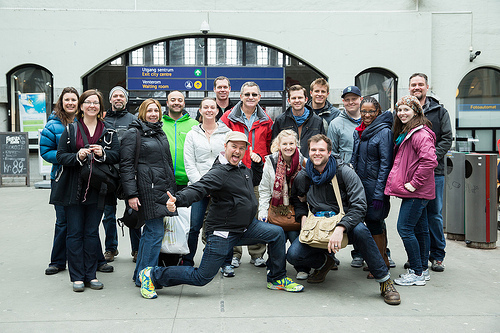
When I reached the End of the World, Benny and I had a party to celebrate. I grabbed a vodka-soda from the bar as Benny had a soda-soda, and we celebrated with 200 awesome people who had also made the trek to Oslo.
A lot of things had changed since I first began the journey. The quest gave me confidence and a bigger vision for my life. I’d started as a solitary traveler, but ended surrounded by friends.
Oh, one more thing, in case it hasn’t been clear from the above post: the main purpose of the book (and this post!) is to communicate a message that extends beyond a collection of stories. That message is that a quest can bring purpose and meaning to your life.
If you’re discontented, or even if you’re happy but you want more from life, maybe it’s time to pursue a quest of your own.
Big thanks to Benny for having me here on Fi3M. I’m a huge fan! Thanks to all of you for reading as well. 
September 25, 2014
Dealing with life in language learning challenges: 60 day group update
You may remember the one month update coming from three different language learners about a month ago. All three are back and ready to let us know how things are progressing at the month two point. This discusses an issue that we all have to deal with – life getting in the way of our language learning projects. What do we do when this happens?
To see our three learners perspectives, I’ll let the Add 1 Challenge organizer Brian take over once again:
———
When the initial excitement wears off after you take on a new language or after you start a new language learning program/book on your own, what usually happens?
Life!
Distractions, travels, unexpected events, boyfriends/girlfriends, work, school, family, it may even seem like “life”, is on a mission to ruin your language learning plans and preventing you from finishing what you started.
This is when thoughts like, “Let’s put language learning on hold.” or “I will get back to it next week.” show up and where most people quit.
Will learning in a community collaboratively in the Add1Challenge magically solve all this for you?
Of course not, but it will be a place where you can practice dusting yourself off and getting back up on the language learning wagon with the support of other language learners who are going through the same journey.
Since the last update 30 days ago, let’s see how Emily, Kenneth and Kevin dealt with “life” in the past 30 days of the Add1Challenge!
My name is Emily Corral and here is my Day 60 Add1Challenge Update: Studying Spanish went great for the first 30 days, but then life happened.
Coming back from vacation meant catching up on emails, work, etc. I was so busy; I didn’t practice Spanish for a week and a half! If it weren’t for the Add1Challenge, I would have completely placed language learning on hold. Luckily, I had accountability partners to keep me on track 
I realized I needed to become more creative with my time. So I adjusted my goal from studying 30 minutes a day, 5 days a week to studying 60 minutes a day, 2.5 days a week. Tailoring my study plan to fit my changing schedule made all the difference. I now have a much more attainable goal.
My favorite resource over the past 30 days has been a podcast called Show Time Spanish. I enjoy listening to Show Time Spanish because I can multitask while the podcast runs in the background. If there is an interesting phrase or section, I am able to write it down and come back to it later. I’ve learned many interesting phrases this way!
Another way I’ve found to sneak in language learning is to download apps on my phone. When I’m stuck waiting somewhere, such as on an airplane, I take out my phone and play fun Spanish games. One of my favorite apps is Mindsnacks Spanish. Some days it helps to learn like a little kid 
In the next 30 days, I hope to continue my language learning progress. I plan on incorporating fun activities to keep me interested, such as reading Harry Potter in Spanish!
I’ll keep you updated! See you on Day 90!
Hi! I am Kenneth.
When I first moved in with my current housemates, one of them, Damien, was fluent in French and Spanish, had basic Welsh and was learning Russian.
I would get home and he would be listening to Spanish music, when I was watching TV he would be watching Russian cartoons on the iPad, and when we got drunk he would ‘forget his English’ despite it being his mother tongue. It sometimes annoyed me and I would make fun of him but he always told me how proud he was that he could speak and understand these languages.
I began my Romanian challenge 60 days ago, and I have found myself listening to Romanian radio at work, watching cartoons at home, and reading news stories on the train; all that annoyed me previously, I am now doing myself! I have also found myself talking to Damien about the language learning process and finding similarities between Romanian and the languages he speaks, I come to him with some of my problems and look forward to telling him about my success and the new resources I have found.
This is also the same community the Add1Challenge provides, I may be the only member learning Romanian at the moment, yet any problems I have, they band together to help and advise, any achievements I make (big or small) they cheer me on, likewise I feel motivated in myself seeing others successes and helping them through troubles.
Friends and family will always be supportive, but another language learner will understand what you are going through.
Fluent in 3 Months and its forums has created such an environment, and the Add1Challenge take us even further by putting us in the same boat from the beginning, in our smaller groups I am making friends and talking to fellow learners who are striving for the same goal in 90 days.
I had begun to feel myself reaching a plateau in this second stage of the challenge, feeling complacent that I could understand enough, even though I couldn’t speak properly yet. Without this community spirit, the plateau would have hit me hard, but the excitements and shared resources within the group keep us all going. Brian shared Bliu Bliu, such a simple concept yet I want to check it more and more each day. I have also just begun using Memrise along side one of the books that had been gathering dust.
Taking each “Yay” (day) at a time, I have fought through obstacles, come through (what I think was a) plateau, and entering the final stage before our 15 minute conversations on day 90. I need to shake my routine up a little, keep it fresh and have fun. I have made great use of Anki, iTalki and BliuBliu, and now I will begin using Memrise to work my five minutes of talking into a real conversation learning grammar rules and creating sentences!
Talking of community spirit, please feel free to follow me on Memrise and my own blog at www.thesilentharp.co.uk and remember, whatever your language objectives or resources, be a part of the community and above all, have fun!
My name is Kevin and since the last post, I’m pleased to report that I have been maintaining a daily language learning routine. It hasn’t been easy, but I believe the key to success when learning a language and in the Add1Challenge is maintaining consistent progress despite all the obstacles life throws at you and without losing faith that you are actually making progress!
We all know that eating a healthy breakfast sets us up for the rest of the day; so for me every day begins with a thirty minute “Memrise breakfast”.
It’s good because on the days where I don’t feel I’ve made so much progress, seeing that dashboard notch up a few more items grown dispells my doubts and reminds me that yes, I am actually making progress. As the day unfurls, no matter what anti-language learning forces push against me; the nutrients of my “Memrise breakfast” release themselves through occasional pockets of downtime.
For example, the other day, Memrise taught me によると and throughout the day, whenever I found myself put on hold in a telephone queue, rather than sit there listening to the cheesy music, I played a little game of seeing how many sentences usingによると、I could make before my call was taken. My record was 23 sentences whilst waiting to speak to someone at the electricity company!
Since I will be moving to Japan soon (YAY), I’ve been putting my belongings into storage. One of my friends had recently moved house and said they could empathise with my pain. It was then that I realised,
Wow, I’m moving country, I’m renting my apartment out, I’m starting a new job, I’m starting the final module in a masters degree and I’m also doing a language challenge, I’m still managing to do regular memrise breakfasts, italki sessions around lunchtime and occasional evening dinner with Japanese natives at meetups or via Skype.
Sometimes feels like I’m in the eye of a storm; with so many things whirling around wanting to sweep me off my feet and into a language learning void. But that’s the thing, the sweetest thing of all: doing these language challenges teaches you how to avoid getting swept off your feet; how to avoid getting distracted, demotivated, stressed, pushed and pulled by all the immense forces conspiring against you learning a language.
This is the power of participating in the Add1Challenge; I’m no longer making excuses as to why I haven’t been learning Japanese; in all honesty, I don’t even contemplate not fitting in an hour of Japanese into my day. I feel like the Add1Challenge gives me the power to be an effective Memrise farmer on the verge of harvesting my crop! See you in 30 days!
———–
Accountability partners, “taking each ‘yay’ at a time” refers to completing a day’s learning goal and “checking in” in the Add1 Accountability Spreadsheet, seeing other language learners’ progress and being able to help others, learning how to dust yourself off after a fall with a community of language learners who’ve got your back are just some of elements that the Add1Challenge can support you to stay in the game.
Add1Challenge can make things easier and more fun, but ultimately, you still need to show up for practice, get yourself on the court and play your heart out if you want to get breakthrough results, because at the end of the day, no one can do that for you.
So if you like to join the Add1Challenge team to support you to finally make progress in speaking the language that you’ve always wanted to speak, you can sign up here and you will be notified once we open up for applications.
September 19, 2014
The Unglamorous Side of Being a World Traveler
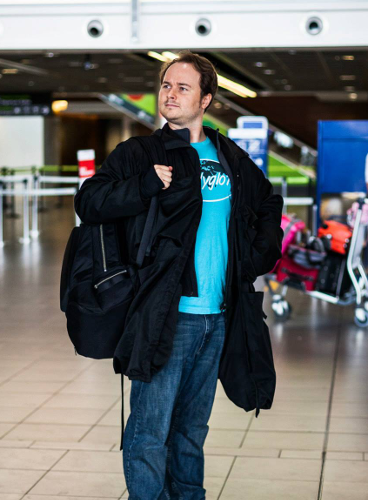
“I wish I could travel all the time – it seems like a dream come true!”
I read something along these lines on Quora the other day, and all I could think while reading it is that while travel is one of the most worthwhile things I’ve done in my life, travelling ALL THE TIME is actually… sometimes… a bit of a nightmare.
Today marks the end of over 9 months of non-stop, intensive travel and I’m exhausted. I’ve been looking forward to this day of being able to sleep in one bed, shower in the same shower, and have the same living space (for at least a few consecutive weeks), for months!
So no, travelling all the time is not the wonderful life people dream it up to be, and it’s one that I’m very glad to be finished with for quite a while. Now I’m back to slow travel mode, which in my opinion is the best way to do it. And now that I have the time to write again, I would love to share this weird new experience with you all, and hopefully show you some things about settled life that I’ve really missed during my intensive travels, and that you should remember to appreciate if you are one of the many people leading a settled life.
That’s right, there are a lot of great things about a settled life that you may be taking for granted! Today, let me show you the side of constant travel that glamorous accounts of it (and my instagram photos) never clue you into.
Check-out, rush, travel, check-in, rush, collapse, rinse and repeat
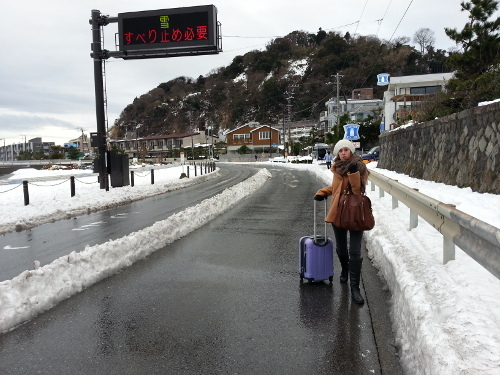
We have been on the road all year long, travelling Japan at first, and then promoting language learning by encouraging people in person, while promoting my Harper-Collins published book. Since people live in many cities, I had a lot of places to visit! We’ve done pretty much all major cities across the UK & Ireland, some stops in mainland Europe and then spent all summer covering 25 American states and 3 Canadian provinces.
When you have a purpose on your trip, everything else takes a second-seat. Maybe you travel to take nice photos, or to sightsee. Maybe you have lots of friends to meet, or parties/festivals to attend. In my case, this year was exclusively to meet struggling and aspiring language learners and try to give them some inspiration. Bookstores gave me venues to do this.
Since this was the purpose in each city, I wouldn’t really have time to do anything else. In America especially, we’ve usually had 3-6 hour drives between cities, which already takes huge chunks of time out of the day.
The “routine” Lauren and I have had for months has been to wake up, find whatever food we can for breakfast, sometimes not eating until the afternoon, rush to check out and usually only have time to drop our stuff in the car (rather than pack it properly so things would be easier to find), have an incredibly boring long drive (with Christian rock or country music as the only stations a lot of the time), arrive just in time for a book signing (GPS or not, problems while travelling will arise), where I’d rush in and likely be hungry and tired but have to put that aside because many people there have themselves driven hours for that meet-up. Then I give a presentation and answer questions to satisfy up to 100 people at a time (here’s how typical book signings went), then find whatever food is nearby, then check in to somewhere else, then collapse in bed.
Having that routine for a couple of days would be annoying, weeks would be exhausting, but we’ve had it for months and are done.
Wonderful things settled people take for granted
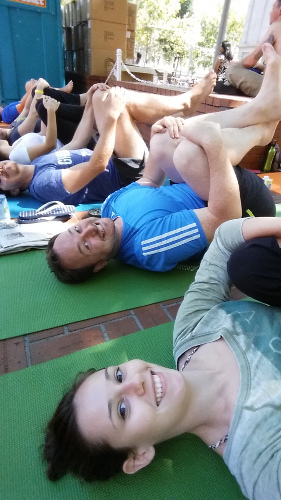
One of the rare times Lauren and I got to break our routine this year was in Portland, OR. We joined in on a yoga world record, and of course it was a lot of fun. These are the snapshots you see intensive travellers like me posting to Facebook or Instagram… not the many hours of sitting in cars or not having clean laundry.
While such snapshots may look like travel is a non-stop adventure, they tend to be outnumbered by more and more frustrating moments the faster you travel.
We’ve gotten jealous of many things that settled people take for granted that we miss like
Having friends you know and can rely on to meet up with
Knowing the area you live in, and where good food is
Better yet, eating home-cooked food, or even being able to buy perishables
Being a “regular” and not being a stranger to everyone you meet
Waking up in the morning and not knowing for a few moments where you are or what language you should be speaking
Being a part of clubs, sports teams, meet-up groups, singing groups, having consistent access to yoga or dance classes
Not having to check in and out of your home (temporary as it may be) on a daily basis.
If you’re tired, then knowing that this thing called a “weekend” is coming up where you can catch up on sleep… or at least unwind with something you know you can find easily
Basic things that you need or even like suddenly becoming an uncertainty, like finding good wifi, vegetarian food, coffee, drinking water, a comfy bed, a quiet place to work
The ability to know with relative certainty how your day is going to look, and to plan around that
The time and means to take a shower, do laundry, get a haircut, repair a broken device, Skype or write to friends and family, go to a supermarket, and even to just stop and read a book for more than 10 minutes
Being able to receive mail and packages
Feeling at home and like you belong somewhere and are not just a passer through with superficial knowledge of your surroundings.
You can’t always be “on” – you have to take a break from appreciating where you are
Plus, being a tourist every day is just not the ideal way to live your life. The novelty of being somewhere new and meeting new people wears off quickly, and you start to crave aspects of settled life, and try to use whatever time you can to get a glimpse of aspects of what you have been missing- like sitting on a sofa and reading a book- which of course takes time away from exploring where you are. I would have loved to have seen more sights in great cities like Nashville and Chicago… in theory. But during the few days I had there, what I really wanted to do in my few hours of spare time was go home and maybe wind down with some Breaking Bad.
I remember when I hosted Couchsurfers in Prague – a small group on a break from college. They had been on a 2-month Euro trip and Prague was one of their last stops. Prague is of course an amazing city with culture, architecture, fascinating people and a wonderful city centre to explore. I asked them what they did when they got home from the first day out and they said that they hung out in a Starbucks and went to the cinema to see Transformers!
At the time I was really disappointed in them to have wasted their chance in this city, but realistically they had seen so many “old buildings” over 8 weeks that all the sights started to blend together and they couldn’t appreciate them any more. They had spent months walking around cobble stone streets and had been worn out. They just wanted a piece of home.
On my own trip, people have asked me what I saw in Kentucky, if I’ve explored Tennessee, if I’ve sampled the food in South Carolina, or if I took the time for a quick day trip to see something wonderful in Illinois. Sometimes we could fit in some sightseeing, but many times my answer was a very boring “We finally found a laundromat and cleaned our clothes!” or “I took the whole day to catch up on my email backlog” – things that simply have to get done eventually, and if you travel all the time then you will be wasting the opportunity to be in somewhere interesting when you have to catch up on essentials.
The day-to-day stuff like having a doctor’s visit, catching up on family photos on Facebook (or Whatsapp), or anything I’ve listed above – people just take these things for granted. But ultimately, there are highs and lows to any lifestyle.
Rapid travel is expensive
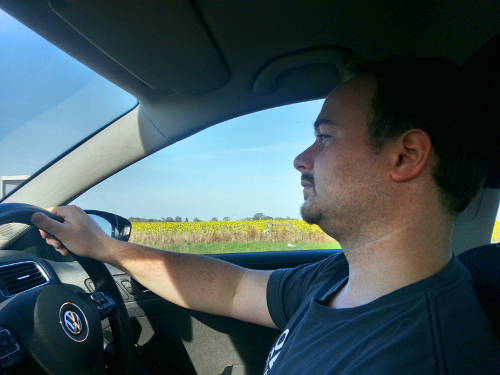
One of the biggest disadvantages of a fast travel lifestyle though is the cost.
This has been the most expensive year of my life, with petrol/gas money (in America, public transport is the worst I’ve seen in any first-world country, so car rental is essential), single night stays, eating out way too often (we prefer to eat in and cook, but if you have a 6 hour drive in Florida heat, you can’t quite store food in the car…).
As well as the speed, the choice of countries for me this year was among the worst you can possibly pick if you don’t want your wallet to hurt; Japan, the UK and America are really not so budget-travel friendly compared to other places!
I’ve had month-long intensive travels through countries like Italy and India and it’s set me back dramatically less. Even so, rapid travel expenses are one reason why many people think travel in general is not affordable. Nothing could be further from the truth.
The highs and lows
This year has been a rollercoaster of experiences, with many crazy fun adventures, with a lot of very long, dull drives, meeting old friends, making a few new ones, and staying in more places than I can ever remember.
Here is a behind-the-scenes look at some of my lower moments from the last 8 months of non-stop travel:

Eating pizza every day for longer than I want to admit.
During one leg of the trip, we were so busy and in desperate need to catch up on work, that when we had the chance to stay in one place for several days, we didn’t leave the house and lived off delivery pizzas. I’m not proud. In this place, I had so little time I didn’t even make the time to find an alternative plug for the coffee maker and it stayed on the floor!
“Recycling” dirty clothes
And going several days without a shower or shaving, more than once, due to lack of time from needing to hit the road.
Logistical nightmares
About three times, I drove toward the venue for a book signing, eagerly ready to encourage language learners, and been told by the book store that they “forgot” I was coming, had no place for me to talk to people, and had none of my books on hand. Don’t worry, though, after that happened the first time, I always carried extra books in the car

Getting stranded and explaining myself to the law
In Japan, when we arrived at our temporary accommodation, we could not get in and ended up lying on the ground in the hall in the winter at 11pm. Then we had the police arrive and ask me to give a statement… in broken Japanese.
Forgetting to account for jetlag
I had the genius (?) idea of arriving from Tokyo into L.A. with 16 hours jetlag, then hopping in a car and driving 8 hours a day for 3 days in a row all the way to Texas. To say that I was grumpy doesn’t begin to cover it.
Discovering work disasters in the middle of a book signing
On one of the most intensive travel days with hours of driving, I had a splitting headache, but put all my energy into encouraging a very enthusiastic crowd who showed up for a signing. When I took 2 minutes to myself to splash my face with water and check my email, I saw that my site was down AND someone was spoofing my email address (both are now fixed though!) However, when people get spammed they can reply with pretty cruel words, whether you actually spammed them or not, and I had to sift several hundred venomous emails out of my inbox over the next days.
That time I went deaf
In Germany, I went partially deaf in both ears and I had to scramble to find a doctor. The crappy one I went to told me I needed surgery if I ever wanted to hear again. I was, you might imagine, upset. Luckily a second opinion in America found that it was just an allergic reaction, gave me some pills, and I was fine a few days later. Phew!
Feeling constantly a mess
I only travel with 23kg of stuff, but I haven’t been able to fully unpack my bag for months (Why unpack fully if you are only staying for a night or two?) – everything just gets thrown into the bag, and then I keep wishing I could unpack and arrange my things to be able to find smaller items easier. I’ve re-purchased wires and other electronics I thought I had lost only to find them a week later in the depths of my bag!
Killing 47 cockroaches
This actually happened during my book launch! We had been waiting months for a 3-week stay in Austin, Texas for the SxSW festival last March, where I launched my book. We arrived and within 5 minutes discovered a massive cockroach infestation. I had to kill and dispose of forty seven roaches. Our bags stayed packed and on top of the sofas for the entire stay and we couldn’t use the kitchen or hang out in the living room. We were trapped there, since you can’t get last-minute accommodation during the SxSW festival that would be convenient without paying over 10k.
THIS is a more accurate description of what constant travel really looks like. A lot of chaos, a lot of unexpected changes to your itinerary, and occasionally some cockroaches.
But don’t get me wrong. I remember all the time that I am a very lucky guy indeed that I get to lead the life I do, and I’m very happy to share with you some of the great times I’ve had during these 8 months of intensive travel:

Spending a friends weekend off in Las Vegas with Steve, Matt, Liam, Sean and several others. One definite advantage to touring the states was getting to meetup with friends who live in all its different corners!
Meeting Lauren’s family in Maryland and going tubing on the same lake they’d go to as a family when she was a child. I was the only one in the group who could not be knocked off of the tube at full-speed

Meeting so many language learners and hearing their inspirational stories and kind words. While some events went less than ideally, the vast majority of my book signings were standing room only, with very warm receptions by bookstore staff, and amazing experiences that I feel honoured to have participated in. I got to see my book and all this hard work pay off, as it became an international best seller and was on shelves in even random bookstores I walked into.
Eating new foods I’d never tried like Cuban food, southern biscuits (very different from European biscuits) and simply all the days when we weren’t in a hurry, and Lauren and I just hung out and explored.
Some amazing media and TV appearances like on RTE , Bloomberg, BBC and on ABC’s Daytime
Going to Harry Potter world in Universal Studios, and drinking a butter beer!
Hanging out with Tim Doner, him taking me to his favourite bookstore (Strand) and randomly seeing over a dozen copies of my book featured very prominently! Seeing this in a prominent bookstore in New York City was a big deal for me.
Beautiful scenery. America can be really beautiful. On a very long drive one day, the dullness of the drive changed when a storm was brewing ahead of me. The sunset against the clouds formed a gorgeous orange tint and then lightning struck between the clouds (not down to the ground). It was quite a sight.
In any lifestyle you will have highs and lows. I think the unpredictability of a travel lifestyle brings in way more avenues for variation, and as such you’ll have more of both. Being in new places gives you the chance to live new experiences.
But in my opinion, there is one way to make it lean way more towards positive experiences than negative ones:
The only travel lifestyle I’d recommend
While this post may seem like a negative view on travel, as many of you know, I’ve been on the road for over 11 years and have learned so much from this amazing opportunity. The last 9 months however have been unique in that I’ve been moving every other day all year long, with just a couple of rare stays lasting an entire week or two.
This is in stark contrast to the majority of the decade before this where I would stay in the one place for 3 months, living in the same accommodation and getting to know the one city, people and language well.
I generally consider myself a “slow traveller”, and this is the kind of travel I recommend. I’ve lived in 23 countries over the last 11 years – this isn’t a huge number considering the amount of time spent travelling, but it has given me really good time in each country.
To me, three month stays are in the “Goldilock’s zone” of not too short a time in a country as to get sick of travel, and not too long in a country as to not need to worry about visas and to get enough time to really feel like you’ve seen it, while still being mobile enough to experience multiple countries.
Remember to appreciate the charms of settled life
Despite the struggles of the fast-travel lifestyle I’m ready to leave behind, I really do always keep things in perspective and recognize that I’m lucky to have the life I do, no matter how many days it’s been since I’ve washed my clothes.
And I would suggest to you to do the same.
I hear all the time, “Benny, you’re living the dream life!” … but to be honest, in a lot ways this year, I have been jealous of YOU living a settled life! It’s true! So don’t take for granted that you get to have a “regular” breakfast place, or a weekly trivia night, or friends down the street you can call on a random Tuesday to go out for an orange juice. I look forward to that being part of my adventure some day!
For the next years though, Lauren and I are back into slow-travel mode and staying in places for weeks or months at a time. I’ll always be travelling, even if eventually I have the same base for several months each year. This constant travel thing isn’t for me though!
I’m glad I got to see so many places in the last 9 months, but now we are ready to unpack our bags, really feel at home, catch up on a huge list of errands, launch a new look to this site (more on that later!), go dancing, and I’ll be able to explore Cajun French too! I’m also glad to report that there are no cockroaches in our place in New Orleans 
Thanks for reading and let me know your thoughts in the comments below!

September 16, 2014
What You Can Do With The Most Common 300 Words In A Foreign Language?
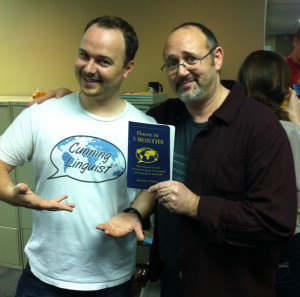
I met Frank, who runs Lingo Interactive, at the very start of this year’s US book tour after being in touch for a while via the blog. When he sent me this great guest post, the Spartan in me couldn’t resist running with it! It’s about picking essential words to learn at the beginning of your language adventure, so you don’t get burned out – very useful!
Over to you Frank:
————
First, a little history lesson…
In 480 BC, a small band of Spartans numbering just 300 — met the staggering and overwhelming forces of the Persian empire at Thermopylae. The odds, to say the least, were not in their favor.
Now, if you’re a movie, comic book, or history buff, you know how the story plays out. You know that the Spartans lured the Persians into a bottleneck, where their superior numbers meant nothing. You know that the Spartans were specialists in fighting as a unit, interlocking their shields, their spears thrusting out dangerously from their phalanx, and that no army on earth had ever yet broken them out of that formation.
For five days — think about that for a second — for five days, 300 men stood toe to toe with nearly half a million men and they were not moved. More, they won decisive and demoralizing victories. In fact, their ultimate defeat came about from a spy’s betrayal and not through any chink in their own armor.
This is the analogy I remember when I tackle a new language; that 300 well-chosen words can hold their own against all the armies of words in the world.

Those 300 words — we’re talking about the 300 most frequently-used words, by the way — represent about 65% of all the words you’ll use on a regular basis. By contrast, 2000 words represents about 90%. The difference between those two is staggering.
Imagine if I had said “steps” instead of “words,” and think of language learning as a journey. With just 300 steps you can be 65% of the way to your destination, but it would take you another 1700 steps to get just 25% closer. In terms of effort vs. reward, those 300 Spartan Words win every time.
Years ago, when I was a young man learning kung fu, I had heard the following expression (straight from Bruce Lee):
“Do not fear the man who has practiced a thousand kicks once. Fear the man who has practiced one kick a thousand times.”
That holds as true today as it did for the Spartans in 480 BC. The Persian army, while superior in number, were comprised of part-time warriors who were drafted into service, spent most of their time traversing mass distances on foot, and rarely saw any action. That’s a perfect analogy for the armada of words you’ll rarely, if ever, use. Like… chrysanthemum or amniocenteses.
The Spartans, by comparison, weren’t just chosen for their utility, but were also trained to work as a unit. Each one of them had been trained since birth for just one task — in this analogy, communication — and in the proper position (a verbal phalanx), they’re unstoppable.
Together, those 300 most common foreign words can allow you introduce yourself, order food in restaurants, check in at the airport, talk about how you feel, the weather, answer basic questions and — most importantly — give you the tools you need to learn words and phrases beyond those first 300 words.
So if you’re learning a new language and you want to make useful progress quickly, focusing on the 300 most frequently-used words is a great place to start.
But allow me to share another quote I heard a lot during my kung fu days:
“Absorb what is useful. Discard what is not.” — Bruce Lee
In your search for soldiers in your own 300 Spartan Words, make sure you grab the words that will be most common to you. Throw away the ones you know you’ll never use.
So where should you start? Luckily, just about anything you could possibly you want to know is just one quick Google search away. Search for “most frequent 1000 words” and you’ll come up with a slew of resources. You’ll also find such lists available for other languages.
Personally, I like the list provided by New General Service List. Based on the original General Service List put together in 1953, this one is a bit updated and seems to have a good handle on what’s actually useful.
Of course, you may be asking… How the heck do they know what the most frequently-used words are?! Great question!
They actually cataloged all the words used over a set period of time in books, newspapers and magazines and ranked them by order of frequency. Recently, the technology has been improved to include subtitles closed captioning tracks from movies and TV, so what we’re seeing now has the benefit of being based on human speech.
Of course, not everyone wants to do all the legwork themselves. Finding that list and culling it down and then translating it into your target language and then putting together a program to learn it can be a lot of work. Trust me. I know. I’m doing it myself. (But, hey, if you want to help me get that work done, I’d appreciate it! We’re running a campaign on Kickstarter right now. Check it out.)
In the end, there are a lot of ways to learn a language, and a lot of ways to travel that road. In the end, though, we all need to traverse these 300 most common words to get where we’re going. Might as well get them done first!
Good luck and happy learning!
September 5, 2014
¿Cómo Aprender Inglés Sin Haber Ido Antes a Estados Unidos? (15 divertidos tips para aprender un nuevo idioma)

Llevo 5 años escribiendo en este blog y todos los artículos son en inglés… hasta hoy.
Sé que muchos de mis lectores no son nativos del inglés y que muchos están aprendiendo inglés todavía. Por eso, vamos a ver qué tal si comparto algunos artículos que no estén escritos en inglés, como el de hoy.
Conocí a Sergio este verano y dado que estaba con mi novia nos habló en inglés. Me sorprendió cuando me dijo que fue su primera vez en Estados Unidos, porque su inglés era excelente. Por eso me alegró de que él se ofreciera a compartir sus consejos. ¡Disfruten!
———
He viajado alrededor del mundo constantemente y cada que conozco a una persona nueva, se sorprenden de mi nivel de inglés que muchos han pensado que nací o viví algún tiempo en los Estados Unidos.
La verdad es que nunca había ido, hasta hace unas semanas justo cuando conocí a Benny por primera vez. Nací en México y toda mi vida he vivido en este hermoso país pero siempre estuve convencido de la importancia de hablar inglés, que ha sido parte fundamental en mi historia, ya que me ha abierto muchas puertas y me ha ayudado a forjar la persona que soy hoy en día.
Por eso en este artículo me gustaría enseñarte 15 divertidos tips para aprender inglés, mientras te cuento un poco de mí y de paso, te muestro algunas razones por las que debes de aprender este idioma universal.
Estudiando inglés desde chico
Tuve la fortuna de haber estudiado en una escuela bilingüe desde los 14 años, aunque eso no fue suficiente porque muchos de mis amigos no llegaron al nivel de poder conversar fluidamente con otras personas extranjeras como yo.
Fue entonces cuando me pregunté cómo es que yo había llegado a aprender tanto inglés si todos estábamos aprendiendo lo mismo…
Por que ahora que lo pienso, cuándo era adolescente era un chico normal, simplemente pensando en jugar fútbol y divertirse todos los días. Aunque me acuerdo que había algo diferente en mí. En la escuela prestaba mucho atención a las clases de geografía, me encantaba saber de arquitectura y me gustaba oír historias de grandes aventureros… entonces un día, después de tanto ver estas fascinantes cosas, me puse una meta: quería conocer el mundo entero.
Y sabía que para lograrlo, necesariamente tendría que aprender hablar inglés si es que quería comunicarme con las personas que iba conocer en mis próximas aventuras.
Es así como aprendí una lección que se convierte en el primero de varios tips que te voy a dar a lo largo del artículo:
1. Busca una razón por aprender un idioma. Ponerme la meta de viajar por el mundo me generó una pasión por aprender inglés todos los días. Y es como Benny también dice en su libro, que la pasión es una de las mayores influencias que necesitamos para aprender un idioma.
La clase de inglés era la única dónde me veías sentado hasta el frente, no me perdía ninguna sola lectura de inglés, siempre tenía las tareas listas y asistía a todas las actividades extra-curriculares.
Pero quería más.
Como siempre he sido una persona inquieta, empecé a buscar maneras de hablar inglés fuera de clase. Y como era un adolescente que sólo buscaba divertirme, te voy a mostrar las formas más divertidas que experimenté para aprender un nuevo idioma:
2. Juega videojuegos. No hay mejor forma de aprender un idioma que jugando Nintendo, PlayStation o Xbox en su idioma original. Sé que ahora los juegos vienen traducidos pero te recomiendo que los cambies a inglés, ya que juegos como Zelda o Metal Gear tienen grandes historias, muchas enseñanzas y aprenderás bastante del idioma mientras pasas un divertido rato.
3. Ve series de televisión. Muchas series que valen la pena ver están en inglés. Cuándo era más chico, yo me moría de risa viendo Drake & Josh en su idioma original. Actualmente, series como How I Met Your Mother se disfrutan mucho más si las oyes en inglés; aprenderás a decir chistes locales, frases cotidianas que usan en Estados Unidos y hasta aprendes algo del acento canadiense.
4. Ve películas en inglés. Si hay una buena forma de pasar el rato y aprender, es viendo películas de Hollywood que naturalmente están en inglés. Un gran tip que yo hago es poner el audio como los subtítulos también, verás que oír y leer el idioma al mismo tiempo te enseña bastante.
5. Habla contigo mismo. Todos hablamos con nuestro interior todo el día, sólo que yo lo hago en inglés todo el tiempo. ¿Lo has intentado? Es divertido hablar contigo mismo en otro idioma, descubrirás tu nivel y aprenderás mucho en el proceso.
6. Lee comics. Si eres fan de los novelas gráficas, compra los comics en inglés (como DC Comics, Marvel, etc.). Estoy seguro que vas a aprender mucho leyendo varias de estas grandes historias. Si eres fan de The Walking Dead, ¡actualmente los comics solamente están en inglés!
7. Escucha música. Sé que tenemos muy buena música en español, pero, ¿nunca has querido cantarle una canción de amor en inglés a una chica? Yo lo he hecho algunas veces… Si quieres aprender otro idioma mientras disfrutas de la música, busca en Internet la lírica de la canción, cántalas y aprenderás mucho.
8. Usa los chats. Sé que ahora está Facebook y las redes sociales, pero los chats (ahora es mejor en Skype) siguen siendo los mejores lugares hablar con otras personas nuevas. Yo hice nuevos amigos en línea mientras hablamos solamente en inglés.
Viajando por el mundo
Cuándo me inscribí a la universidad, en mi examen de admisión teníamos que hacer obligatoriamente un test de inglés, que gracias a los tips que te mencione antes, resulte estar en los más altos resultados de mi grupo. Esto me llevo a no llevar materias extras (era pagar más y perder tiempo) y lo mejor de todo, ¡es que tenía el pase directo para hacer un intercambio en el extranjero!
Era el momento perfecto para cumplir mi meta de viajar por el mundo. Y afrontando mis miedos, por fin me atreví: emprendí un increíble viaje por Europa que duró más de un año y que me cambió mi vida por completo.
Y otra vez el inglés fue una arma esencial para disfrutar mi experiencia, ya que fue el idioma que más usé estando en tierras europeas. Y cómo yo quería seguir mejorando mi inglés, te voy a recomendar algunos tips para aprender un idioma mientras viajas:
9. Viaja sólo un tiempo. Originalmente tenía planeado irme a Europa con un amigo, pero el plan se canceló que fue lo mejor que pudo haber pasado. Es que cuando visitas el extranjero con amigos casi siempre te la pasas hablando tu mismo idioma que te olvidas de los otros.
En mi caso, los primeros seis meses empecé a viajar sólo que me forzó a hablar en inglés casi todo el tiempo. Conocí locales, extranjeros, creé muchos amigos y todos aprendíamos mientras platicábamos en inglés.
10. Vive con extranjeros. Además también te recomiendo que consigas compañeros de cuartos que sean de otros países. Así estarás hablando todo el día en inglés, sea en la casa, en las fiestas o, ¡hasta en el baño!
11. Ten un noviazgo con alguien fuera de tu país. Y bueno, una gran parte de mi experiencia fue encontrarme una bella chica en el camino. Pasamos muchísimos ratos bonitos, viajamos juntos y todo el tiempo teníamos que hablar en inglés por nuestras diferencias de idiomas.
Seas hombre o mujer, si estás en el extranjero, de preferencia encuentra un romance con alguien que no sea de tu país. Así los dos podrán hablar inglés todo el tiempo y te llevarás un gran recuerdo de tu viaje.
Forjando mi vida excepcional

Así que ya había logrado mi sueño de niño, pero la chispa apenas se había encendido. Viajar se empezó a volver parte de mí: después de Europa, viajé un rato a África, luego visité algunos países de Latinoamérica y aún no tenía un motivo de ir a Estados Unidos.
Hasta que recientemente el inglés me volvió a salvar la vida.
Te explico, cuándo terminé la universidad no estaba seguro de que lo que quería hacer con mi vida profesional. Aún cuando me gustaba lo que había estudiado, me sentía perdido y confundido. No quería trabajar encerrado en un cubículo por el resto de mi vida.
En ese momento de desesperación, buscando en Internet encontré unos blogs en inglés que hablaban sobre personas ordinarias haciendo cosas extraordinarias: gente viviendo de sus pasiones, viajando todo el tiempo, ayudando a los demás, creando increíbles movimientos y desafiando el status quo.
Me enganché rápidamente. Consumí estos blogs por horas y finalmente me decidí a lanzar mi proyecto freelance en diseño web, que después de mucha insistencia, ahora me permite seguir viajando, trabajar a mis tiempos y hacer un impacto.
Si no hubiera sabido inglés ni de estos blogs, quizás nunca me hubiera atrevido a cambiar el rumbo de vida. No quiero saber que hubiera pasado, por que ahora estoy muy feliz con lo que hago.
Y ahora que estoy en la etapa de mi vida profesional, curiosamente sigo aprendiendo a hablar más inglés. Así que, una que te decidas a emprender un proyecto de vida, te voy a recomendar algunos buenos tips para seguir aprendiendo inglés en el camino:
12. Únete a una comunidad en línea. Busca algún sitio web en inglés dónde compartan intereses iguales a los tuyos, busca dónde se juntan, únete a los foros y empieza a hablar con estas personas para crear nuevas relaciones.
Por ejemplo, yo me uní a Fizzle, una comunidad de emprendedores dónde todos hablan en inglés y mientras aprendo mucho sobre crear honestos negocios, al mismo tiempo sigo reforzando el idioma y tengo nuevos amigos por el mundo.
13. Aprende leyendo libros en inglés. La buena noticia es que hoy es día es muy fácil conseguir cualquier libro con un sólo click en Amazon. Pero la realidad es que los mejores libros siguen estando en inglés, así no que queda otra que reforzar tu inglés mientras aprendes sobre tu tema en particular.
14. Conecta con personas que admiras. Empecé a usar mi inglés para escribirle correos a quiénes más me inspiran y así fue como empecé a crear una relación con muchos de ellos.
Por atreverme a hacer nuevas relaciones, ahora tengo un mentor que me apoya en todo lo que estoy haciendo y seguimos toda nuestra conversación en inglés. ¡Qué mas puedo pedir!
–
Con el tiempo que me fui adentrando al mundo de los blogs, me di cuenta de algo muy importante: no había comunidad de personas excepcionales en nuestra zona de habla-hispana que sabía que necesitábamos para este mensaje a nuestra gente.
Y justo en este momento, sentí el llamado. Tenía que hacer algo.
Así es como nació mi más grande proyecto, un blog en español dónde ayudo a las personas ordinarias a hacer cosas extraordinarias, tales como crear un negocio de sus pasiones, viajar más y hasta aprender inglés. 
Pero aún cuando mi proyecto está en español, sigo conectando con amigos y blogs en inglés, que si quería prepararme mejor, debía asistir a las mejores conferencias sobre vivir excepcional, que de eso va el último de los tips:
15. Viaja a Estados Unidos. Aceptémoslo, los mejores eventos siguen sucediendo en este país que es otra de las mayores razones por las que debes aprender el idioma. Y no hay forma de aprender inglés que ir adónde se habla localmente.
Así fue como por primera vez visité a Estados Unidos a la mitad de este año. Primero pasé unos días en Fargo, luego permanecí un mes en Nueva York y terminé el tour en Portland dónde asistí a la mejor conferencia de todos los tiempos: World Domination Summit de Chris Guillebeau, dónde se unen más de 3000 personas con ideas similares para hacer un cambio en el mundo.
Cuándo el evento estaba a punto de terminar, en la fiesta de despedida tuve el placer de conocer a Benny Lewis, que después de hablar un rato, también se sorprendió al saber que era mi primera vez en EUA. Después de la gran charla que tuvimos, lo demás, es historia…
Busca una razón por aprender el idioma

Así que ahí lo tienes… la historia de mi vida a través del inglés. Nunca me imaginé todas las puertas que me ha abierto el inglés desde que lo aprendí a muy temprana edad. Literalmente cambió mi vida y me enseñó un mundo nuevo de posibilidades que quizás no hubiera conocido.
Mientras esperamos que el Esperanto se reconozca más, el inglés sigue siendo el idioma “universal” que más se usa para hablar en el mundo. Por eso espero que apliques los tips que te enseña en este artículo, dependiendo en que etapa de tu vida estás.
Y si todavía no has comenzado, no sé que estás esperando. Recuerda buscar una razón principal que te generé una pasión por aprender un nuevo idioma. El inglés te puede abre muchas puertas pero depende qué es lo que quieras:
¿Quizás quieres viajar por el mundo?
¿Buscar tener amigos en cualquier país que vayas?
¿Quieres emprender un negocio en línea?
¿Te gustaría enamorarte de una extranjera?
Una vez que sepas, aduéñate de esa meta, conviértela en tu propósito y lucha día a día por aprender el idioma mientras disfrutas lo que haces.
Por último me gustaría invitarte a participar en nuestra comunidad de personas legendarias en español, solamente visítanos en nuestro movimiento para que podamos seguir platicando y planear la dominación del mundo juntos.
Espero hayas disfrutado el artículo que hice con mucho cariño para esta gran comunidad de políglotas y espero que algún día nos encontremos en cualquier parte del mundo, ya sea platicando en inglés, español, esperanto, ¡o lo que quieras!
September 2, 2014
Tips for Learning Non-European Languages

Now that the summer has wrapped up, it’s time to dive back into language learning, and let’s start with some thoughts on non-European languages! For that, my hyperpolyglot friend Judith Meyer is back and has written up this excellent post for us.
I met in Esperanto gatherings and always see her busy answering Quora questions, writing new language learning books, blogging and doing many many things to help the language learning community grow.
Right now her passion is to launch LearnYu – a free Chinese learning interface, and she’d appreciate any help people can give with that Indiegogo campaign. Over to you Judith!
———–
After learning some Spanish and dabbling in Esperanto, you probably feel ready to tackle your long-term love, Japanese/Chinese/Arabic/Hebrew, etc.
A lot of people are attracted to these more exotic languages, which evoke pictures of foreign lands and fascinating cultures. I have studied Chinese, Swahili, Arabic, Japanese and Indonesian, to varying degrees, and I’m here to give you some tips, because studying these is not quite the same as studying a European language.
Beautify the Writing Experience
For me, Chinese characters were the biggest reason to learn Chinese. They seemed so beautiful and full of secrets! (Having learned 3500 characters, I can tell you that you won’t be disappointed.) If you are planning to learn a language that uses another writing system, take the time to research it and appreciate the beauty.
In particular, look into different writing styles and fonts. Some styles are more curvy, some have harder edges – whatever your preference, find one that you love looking at and then make it your computer’s default font for the language and use it when copying stuff into your exercise book as well.
There are some ways to learn a foreign script that are easier than others (look into my ideas for Korean, Arabic, Greek and Chinese for that), but you will still have to spend more time copying out words than if you were learning a European language. At those times, loving the look of your new language’s writing system can make all the difference between an hour spent copying stupid squiggles and an hour spent tracing a work of art. I have come to treat copying Chinese as a kind of meditation, a way to relax after exhausting work.
Enjoy Unusual Grammar
Asian languages tend to be much easier in terms of grammar than languages like German or Russian. There is much less to memorize. You do have to keep a particularly open mind though. A lot of things will work differently than you expected them to, based on your experience with European languages.
For example, you may be looking at a language where singular/plural is not specified because people didn’t think it important to know if there’s one enraged bull charging at you or several. Exotic grammar can also be quite entertaining, for example the use of doubled words:
Děng = Wait (Chinese)
Děngděng = Wait a bit
Burung = Bird (Indonesian)
Burung-burung = Birds
Or the way that Swahili adjusts the prefixes of many types of words to match each other, so you might get a sentence like Watoto wadogo watiga wanalala (Three little kids are sleeping). Is it irreverent to consider these grammar features ‘entertaining’? Maybe, but I believe that a bit of irreverence will go a long way towards making grammar easier to remember.
Use Strategies for Vocabulary-Learning
When I first started to study non-European languages, the biggest adjustment I had to make was in learning vocabulary. For French, Latin, even Modern Greek, Lithuanian and other languages, it had been enough to test myself on production (seeing an English word and remembering the foreign equivalent). Recognition ability (seeing a foreign word and remembering the meaning) would come automatically.
In learning Chinese, I first encountered the problem that I could use words that I couldn’t later recognize if someone else used them. This problem was not particular to Chinese, since I had the same issue with Swahili and other languages later. Once I started testing myself in both directions, my abilities sky-rocketed.
Another issue is that European languages continually get easier as you progress. The beginner vocabulary is often distinct and the higher-level words are often similar:
English
French
Italian
Spanish
German
Greek
brother
frère
fratello
hermano
Bruder
adelfós
(compare:) fraternal
fraternel
fraterno
fraternal
brüderlich
adelfikós
work
travail
lavoro
trabajo
Arbeit
douleiá
situation
situation
situazione
situación
Situation
katástasi
Communism
communisme
comunismo
comunismo
Kommunismus
komounismós
theoretical
théorique
teorico
teórico
theoretisch
theoretikós
At the higher levels, you are tapping into a common European vocabulary. This means that in many European languages, news articles will be easier to read than children’s books, if you’re a foreigner and often read news articles in your native language.
Depending on the language, non-European languages may surprise you with some European vocabulary at the higher level (Indonesian is an extreme case), but mostly you don’t get this benefit. Comparing Chinese, Japanese, Arabic, Swahili and Indonesian:
English
Chinese
Japanese
Arabic
Swahili
Indonesian
brother
gēgē
ani
‘akh
kaka
kakak
work
gōngzuò
shigoto
?amal
kazi
pekerjaan
situation
qíngkuàng
jokyo
Haala
hali
situasi
Communism
gòngchǎn zhǔyì
kyousan shugi
shuyu3íyya
ukomunisti
komunisme
theoretical
lǐlùn de
rironteki
nadhariy
kinadharia
teoritis

At the conference where I learned these words
You see that sometimes Arabic and Swahili are close, sometimes Swahili and Indonesian are close, sometimes there are some European roots thrown in, but there will still be many words that are hard to peg. This means that you need to have a strategy in place for remembering them.
The key to remembering is making a lot of connections in your brain. If you think of your memory as a net where each word is a knot, the knot is only as firmly attached as there are links going to it. If there is only one link, the knot is drooping, hanging dangerously over the precipice. The brain regularly randomly cuts links, so you have to make many links in order not to risk losing some parts entirely.
For really foreign words like the above, you cannot trace them to European words with the same meaning, but you could use the following tricks for memorization:
Trace them to related words in the same language, create word fields, e. g. Indonesian pekerjaan (work) is related to bekerja (to work), pekerja (worker), kerjasama (collaboration) and so on.
Link them to the parts that they are made of – understanding this is particularly useful when studying Chinese or Japanese words. For example, the Chinese and Japanese words for Communism translates to “together-produce ideology”. That’s much easier to remember than gòngchǎn zhǔyì.
Produce mental imagery that link the words to images, sounds, smells, situations.
Relate them to similar words in other languages, even if they are unrelated, e. g. in Finnish, raha means money, and I remembered it because in Swahili, raha means joy.
Your mnemonics don’t have to be perfect either. If you can’t find any word that sounds remotely similar to shuyu3íyya, it’s fine if you link just shuyu to English “shoo you” – if you remember as much as shuyu, your brain will usually supply the rest of the word on its own. For long, foreign-sounding words like this, having a mnemonic for the first two syllables or even just the first syllable is often enough.
Develop Culture and Expression

When progressing towards a higher level, you also need cultural knowledge in order to understand texts and movies or in order not to make a faux pas in conversation. For European languages, this is comparatively easy – a lot of current events, history, customs, religion, mythology are shared knowledge between our cultures. Even the most popular movies and books of another European country are often somewhat known abroad.
When working on a non-European language, you generally lack a lot of that cultural knowledge and it may become a stumbling block to your mastery of the language, so be sure to plan in some cultural sessions and get an early start on all the things that fascinate you about the country.
If you watch cultural shows in your target language (with subtitles), you have the added benefit of getting more exposure to your target language. I found that getting enough exposure is much more important in non-European languages than in European ones, because the way people phrase things is very different from what you’d expect.
In European languages, you can usually get away with translating whatever you wanted to say word-for-word into your target language, with only minor adjustments, but non-European languages often have very different ways of expression. If you listen carefully, you’ll find that common situations, which you thought boring and unambiguous, are experienced differently in different languages. Really amazing insights there!
Resources
Benny often says that the search for the perfect book is a waste of effort, that you can study with any materials, and I do agree. Still, some materials are so much fun to use that I cannot but recommend them:
GLOSS, countless multimedia lessons for many languages
TEDx, watch local TED talks in any language
Children’s library, online children’s books in ANY language
Kiswahili kwa Komputa, 3 years’ worth of Swahili lessons online, by the University of Georgia
LearningArabic.eu, the most modern Arabic course on the net
Let’s Learn Japanese, great video-based Japanese course for absolute beginners
Erin’s Challenge, fun Japanese course for upper beginners
Wordbook, a website that can automatically evaluate and help you improve your Chinese pronunciation
CCTV Learn Chinese, lots of different video series for learning Chinese. I especially like “Happy Chinese S1″ for beginners and “Travel in Chinese” for intermediate learners.
Actually I have been dismayed at the state of online Chinese teaching. The CCTV courses are big-budget and fun, but they are video only, which means that you only listen and never get to do any exercises or say anything in the language unless you create such opportunities.
I have been working on a site that teaches conversational Chinese with a very active approach, where you get to personally use the language a lot and apply it in conversation with the computer. The site is also intelligent in that it can tell which words you have trouble with and figure out which exercises will be the optimal practice for you.
I call this site LearnYu. If you want to be among the first to get to use LearnYu, or get more advice on learning Chinese and other foreign languages, check out my Indiegogo campaign.
Whichever method you choose, learning a non-European language is very rewarding and I can recommend it to everyone. Good luck with your studies!
August 28, 2014
What you missed: The best language news/links over the summer
 How’s your summer been? I have been (and still am) travelling almost every single day to encourage language learners one-on-one, but I know a lot of you have had your own language projects to keep you busy!
How’s your summer been? I have been (and still am) travelling almost every single day to encourage language learners one-on-one, but I know a lot of you have had your own language projects to keep you busy!
Since you may not have been browsing the Internet as often with so much sunshine to soak up, I thought I’d catch you up on some of the language news from the blogosphere and elsewhere that you may have missed over the last months.
Luckily Fluent in 3 Months team member, Joseph, scours the web for the best blog posts, apps, tools, news and language encouragement every week to add to links I send to over 60,000 people in the weekly newsletter. Make sure you’re signed up to not miss a thing.
Among our discoveries this summer we have…
General language resources
Completely free online comic books - This page has online comics to read in Arabic, Catalan, Dutch, French, German, Hindi, Italian, Tagalog, Portuguese and Spanish. Well worth checking out!
Using Quora as a language learning tool – The website Quora, and especially its language learning topic can be a great source of inspiration and answers to your language learning questions. This post introduces why. [Also, don't forget to follow me on Quora as I get more active after my booktour!]
Talks at the Polyglot Gathering – This Youtube channel shares the uploads of the fascinating talks given this year in Berlin by many experienced language learners.
TuneIn – the biggest database of live streamed radio from many countries. Use it for actual native spoken content in whatever language or dialect your heart desires.
Youtube trends – select the country of the language you are learning and see what is trending on Youtube there. A great way to watch fun videos and get some practice.
Language specific resources
Chinese skill the app – while Duolingo slowly grows its language-base, other people are filling the gaps and this app does it beautifully for Chinese. Well worth checking out this free app if you want to learn on your smartphone
Russian Grammar and the Cyrillic Alphabet: Not that hard after all! – More encouragement for Russian learners in this well written post
BrazilPod launches Língua da Gente, new series for beginners – Another gap in the market finally getting filled, is this well thought out new podcast for beginner Portuguese learners
Stressifier – For the English learners and teachers out there, this tool highlights the syllable of the words in bold to help emphasize the stress
400 French Songs (Playlist with Spotify) – More than 24 hours of French Music – Carefully selected playlist of some amazing songs in French. This will keep you busy for a while

30 French movies to watch in a month – Why not devote one day per movie in this list and watch some high quality French cinema?
Improving your language learning skills
Why You Have Trouble Remembering New Words, and How You Can Fix It – This article by Sam dives into mnemonics, memory palaces and other cool tricks to help you learn words in your target language
6 Memory Strategies To Supercharge Your Learning- After starting with mnemonics, this article offers several other cool ways to improve your language learning memory
How to read in a foreign language – Luca takes on the topic of improving reading skills in your foreign language
How to Keep Learning a Language when You No Longer HAVE to – Another great compilation post with thoughts from various different language learners (including myself)
21 principles for learning a new language – Ollyshares his top tips for those of you who need guidance in language learning.
Food for thought in language learning
Lessons learned from a failed language project – I always tell people that you need to fail your way to success and make lots of mistakes. It’s the best way to learn and improve your strategy. This post shares one learner’s perspective from things learned in one attempt.
Does speaking another language change how you think? – Scott Young is on his final months of a year without English, and it’s helping him answer some interesting questions with his new perspective
For rare languages, social media provides new hope – A great reminder that some neglected languages have a bright future in the 21st century
How many hours to learn a foreign language – This post from Judith looks at the question logically
Fun!
“Weird Al” Yankovic – Word Crimes - A funny video about language learning, grammar and speaking/writing correctly, from musical satirist Weird Al Yankovic!
The Germanizer 3,000 – For those of you learning German who want a laugh!
20 Questions in multiple languages – This fun game asks you questions about an object or concept and it has to guess what it is. Amazingly accurate and worth a try! On this site you can find it in French, Chinese, Hungarian, Polish, Spanish, Dutch, Czech, Portuguese, Turkish, Italian, Japanese, Greek, Norwegian, German, Danish, Swedish and Finnish.
Breaking Bad is getting remade in Spanish -For those of you who liked the original, watch out for the Univision remake, called Metastasis. The main character is even going to be called “Walter Blanco” – I kid you not!
There are a surprisingly huge number of amazing language learning links coming up all the time, both from the web in general and from the highest rated language bloggers.
In the past, I’ve tried following other sites or social media channels and never quite found a good selection of interesting and fun links, and that’s why I got my team to make it a priority to research the best links from all sources, every week. We work hard to make sure you get the best of the best sent to your inbox.
To not miss out on any new fun links that show up, make sure you are on the list!
If you found some fun/interesting links over the summer that Fi3m readers may be interested in, feel free to share them in the comments below 
Otherwise, we look forward to wrapping up the final weeks of the book tour (through Kentucky, Tennessee, North/South Carolina, Florida, Georgia, Alabama, Mississippi, Louisiana) and can’t wait to get back into active blogging – fun things are coming up on Fi3m really soon. I can’t wait!!
August 21, 2014
Why learning in a group beats learning alone anytime (Case Studies)
As a fun change in pace, today we are sharing three stories from people who are in the middle of their 3-month language learning journeys. We’ll catch up with each of them in a month to see how they are doing 
First, I’ll hand the blog post over to Brian Kwong, who has orchestrated the Add1Challenge that has been the support network for these and many other learners. Over to you Brian!
—
“If you want to go fast, go alone. If you want to go far, go together.”
-African Proverb
What is collaborative language learning?
If you have done any kind of team sports like basketball, football etc or even an individual practice like yoga, the experience of practicing by yourself compared to practicing with a cooperative learning group of people is like the difference between night and day.
There is magic that can’t be explained in words when we’re learning something together as a community.
This magic is exactly why the Add1Challenge, where we learn a language together as a community, while striving for the goal to hold a 15 minutes conversation with a native speaker in 90 days, works.
About 30 days ago, we started the #Add1Challenge 4 (#A1C4) and this is by far the most engaging, inspiring group that is producing the most results so far.
Why? Because many of the participants came from Benny’s Fluent In 3 Months blog who’d just completed the “Speak in a Week” crash course.
The “Speak in a Week” course takes away many of the common myths and breaks down your first conversation into small parts so it’s not so intimidating and overwhelming.
This places language learners in a great starting position and if you actually want to speak your target language, striving for the goal of holding a 15 minute conversation with a native speaker in the Add1Challenge; its a very natural progression.
In the past 30 days, we have had many challengers who have taken the leap of speaking with a native for the very first time. Some have kept their consistent learning even on their vacations and some have even met their 90 days goal in 30 days. For example, Brendan, who spoke with his grandmother for the first time in Spanish for more than 15 minutes!
Below there are 3 real life stories from 3 different Add1Challengers on what they’ve learned in the Add1Challenge so far.
You will hear from them again on their 60 and 90 days update on Fluent in 3 Months so you can follow their language learning journey.
Emily

My name is Emily Corral. I’m 24 years old and I’m from Tulsa, Oklahoma, in the United States.
 I’m learning Spanish so I can communicate with my friends in Spain and Mexico better. I love to travel and hope to make a solo trip to a Spanish speaking country one day! And I hope to become fluent in Spanish.Before the Add1Challenge, I thought I didn’t have enough time to study another language. I found out that I was wrong! Breaking my study time into five 30 minute sessions a week was just what I needed to stay focused.
I’m learning Spanish so I can communicate with my friends in Spain and Mexico better. I love to travel and hope to make a solo trip to a Spanish speaking country one day! And I hope to become fluent in Spanish.Before the Add1Challenge, I thought I didn’t have enough time to study another language. I found out that I was wrong! Breaking my study time into five 30 minute sessions a week was just what I needed to stay focused.
The Add1Challenge has taught me that language learning should be FUN! I love the study and accountability learning groups. My language buddies Erinn, Nina, Brad, and Nancy have been so helpful by keeping me on track and sharing their favorite resources. My new favorite app is Memrise.
After 30 days, my routine is to switch up the way I study. Three days a week I play Spanish games, study vocab, watch Youtube videos, send WhatsApp messages, and write letters. Twice a week I use iTalki to practice speaking Spanish. Speaking on iTalki was scary at first, but I’m so glad I took the leap. I love trying out new tutors and making friends. Follow me on iTalki!
 The next 30 days I will continue switching things up since that seems to be working. I hope to download podcasts to listen to in the car during my 20 minute commute to work. My favorite podcast series is called Coffee Break Spanish! I also plan to start a blog called Travelling Tulsan in which I document my traveling and language adventures. Currently, I am on vacation in the beautiful state of Maine. In this post you can see some images of me studying 1,762 miles from home
The next 30 days I will continue switching things up since that seems to be working. I hope to download podcasts to listen to in the car during my 20 minute commute to work. My favorite podcast series is called Coffee Break Spanish! I also plan to start a blog called Travelling Tulsan in which I document my traveling and language adventures. Currently, I am on vacation in the beautiful state of Maine. In this post you can see some images of me studying 1,762 miles from home 
Ken

Bună ziua, mă numesc Ken și sunt din Birmingham, Anglia. (Hello, my name is Ken and I’m from Birmingham, England.)
I began learning Romanian a short while ago to communicate with my friends – rather than them having to revert to English to communicate with me – I have tried books, CDs, Skype, face to face, all with little success. After the Speak in a Week challenge I am now participating in the exciting Add 1 Challenge.
We are now nearing the end of our first 30 days; this first stage is about finding a routine and experimenting with learning styles. Three weeks down and I was ready to throw in the towel; just before the challenge began, my workplace received new ownership, with limited resources, stress was at an all time high, week two and my grandfather passed away, week three and I was coming down with the flu as well as the funeral and family to see. All this time there was more going on at home. To re-encourage myself I tried to meet up with my friends, yet they had returned home to see their own families.
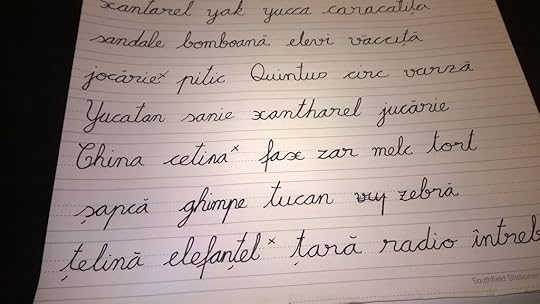 Despite this I did not want to let my team down in the Add1Challenge so I ensured I got my daily practice in, Anki deck on the go, and a few language partners to talk to.
Despite this I did not want to let my team down in the Add1Challenge so I ensured I got my daily practice in, Anki deck on the go, and a few language partners to talk to.
I felt excited when I reached a point I was able to understand words on a Romanian radio station, I was Shazam-ing songs I liked the sound of and downloaded the whole album later that day. A sound I could never understand before, Â, has no English equivalent, within one week of my approach, I could not only hear the sound but also pronounce it!
However, during Week Four, I reached out to Brian asking for advice as I felt ready to call it quits. My achievements were exhilarating, but I did not know how to cope with all these things that are happening in my life and my brain was fried. Brian then shared how he dealt with difficult situations while learning a language in his life and how it is completely up to me how I react to hardships. I then realized that language learning was not an additional stress, yes it takes time and effort, but learning Romanian by burying myself in Anki, listening to the radio, singing songs and exploring Habiticacan can actually be a relief!
I suppose the moral of this story is that whatever language you are learning, and whatever gremlins are in your closet, you can do it! My first 30 days has not been easy, but it has been a massive success, to all outward appearances I have not made much progress, but internally I have learned more in the last 30 days than in the previous year of on-and-off study.
Without Brian’s (and the team members) continued support, I don’t know if I would have still been here to type this post, so a big Thank You! Well, thanks for reading, until next time and you can still follow my journey at www.thesilentharp.co.uk
Kevin

Hi, I’m Kevin Richardson, 45 years old, I currently live in England and I’m learning Japanese.
My story begins in 1998; I’m in Japan, sitting on a train heading towards Narita airport. I made a promise to myself that, “I will return to live in Japan.” However, there was one small caveat; “I would not live in Japan unless I could speak Japanese.” Some 14 years and many excuses later, I was still living in England and my dream had all but faded into a distant memory.
I finally started learning Japanese in the spring of 2012, but didn’t make much progress for the first year and a half. I didn’t make a plan, didn’t learn with any consistency, but above all else, I held a misguided belief that if I “studied” the language long enough the “fluency fairy” would eventually come to visit me.
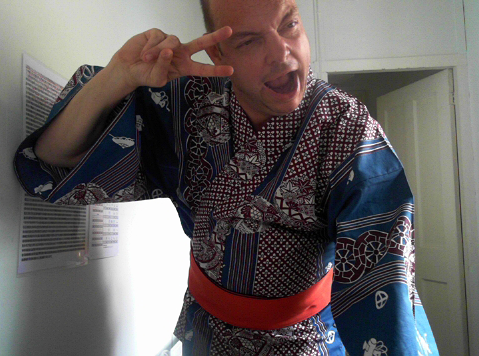 Of course, the “fluency fairy” never called, but having found myself at the Fluent in 3 Months website, discovered that in reality, this roving Irishman was the closest thing to a “fluency fairy” I was likely to encounter. So I decided to try doing things his way instead.
Of course, the “fluency fairy” never called, but having found myself at the Fluent in 3 Months website, discovered that in reality, this roving Irishman was the closest thing to a “fluency fairy” I was likely to encounter. So I decided to try doing things his way instead.
It was at that point that I read about the Add1Challenge and wanted to get on board. I’m now an Add1Challenge veteran; having participated in all four Add1Challenges thus far. This was my video introduction to the latest Add1Challenge:
After the first Add1Challenge, I came away having learned how to be successful at learning a language and my dream to live in Japan came flooding back. I was so confident that when an opportunity to take redundancy from my job arose, the most difficult thing was to refrain from showing my true excitement!
I entered the second Add1Challenge and spent a whole month immersed in Japanese. During that time, I fine-tuned my routine to the point where I knew that I could now learn any skill this way.
 My routine consists of spending half an hour in the morning using Memrise to learn vocabulary. I use textbooks to plan a study curriculum to force myself into unknown territory. I usually have around three one hour Skype sessions with italki tutors each week where I crash around in the language; throwing new vocabulary into a context to see whether the tutor needs to correct me or not.
My routine consists of spending half an hour in the morning using Memrise to learn vocabulary. I use textbooks to plan a study curriculum to force myself into unknown territory. I usually have around three one hour Skype sessions with italki tutors each week where I crash around in the language; throwing new vocabulary into a context to see whether the tutor needs to correct me or not.
This is what I love about learning on Skype with an italki tutor; they type out the corrected way of saying something and we quickly move on. That’s ideal for me because I find I get into a flow and don’t worry at all about making mistakes. I know I’ll just review the chat-box later at my own pace.
On this Add1Challenge, I’ll be moving to Japan a week after the 60 day mark and will have been living in Japan for nearly a month when it finishes. Success means that I will be able to do what I dreamed of in 1998. Yay! Let’s see where this rabbit hole leads!
—————-
This is just a glimpse of how far we could go and what’s possible if we learn a language together in the Add1Challenge as a community 
The Add1Challenge is by application only. This is to ensure everyone who enters the community is serious about learning and speaking their target language.
If you like to be notify when the next Add1Challenge opens up for applications, you can sign up here.
August 14, 2014
Fun and Engaging Language Learning with Children’s Picture Books

While my book tour continues, I’m happy to welcome another guest post about a concept in language learning we’ve all looked into at one time or another – using children’s books to learn foreign languages! Let’s see what Tim from www.theLanguageBear.com has to say on this!
———
There are a several language learning methods that allow us to simulate immersion in one way or another, and are much easier to achieve compared to actually going to the country (which isn’t all that great). Using video conferencing, which is getting easier everyday and generally very cost effective, it’s not difficult to put yourself across the table from a native speaker (as Benny illustrates for us here).
In addition to that, video lessons are becoming more and more accessible and are a brilliant way to effectively immerse yourself in a language, at least for short stints.
Simulated Immersion Language Learning
Skype or video conferencing lessons, being a multi-sensory experience including sight, sound, speech and social and conversational elements is at the top of the list of “virtual immersion” techniques, followed closely by video lessons, but there are other methods that can put us in a good, immersive mindset as well. Foreign language radio programming and television allow us to hear native speakers speaking clearly and communicating effectively and naturally.
This can be good practice for your ears in getting accustomed to the sounds and cadence of the language, however, for beginners this is generally too fast and too complex to comprehend. I’ve struggled with this method and found that my attention begins to wane as my brain tells itself the words are nonsensical, and while I realize that having the sound on in the background is probably beneficial, my brain (again) tells me it didn’t see concrete results and wasn’t productive enough to warrant doing it often.
Foreign language novels can also lend a unique learning experience in that they allow us to witness dialog, descriptions, narratives and written language all within the cozy and comfortable context of a story. Here again, for beginners, this is not a great approach due to complexity and would undoubtedly lead to discouragement and abandonment.
I can also admit to first hand experience with this type of failed study method. After several very fatiguing reading sessions, I’m not seeing enough repeat words to let me know what’s going on or give me any bearing on the story.
Children’s Dual-Language Picture Books
Thinking strategically about the next logical step, I chose to explore children’s picture books. This proved to be a very interesting and engaging method of study. Like Kerstin from Fluent Language states in her post on Benny’s blog, “Any source of a new word is fair game.” There are a lot of benefits to children’s books even beyond TV and radio, and the fact that I could come back to the book and re-read it gave me an approachable self-guided study tool that didn’t judge me (like some software learning methods I know…).
A Fun Learning Language Method
I believe wholeheartedly in a concept that Benny discussed in his TEDx talk; he mentions: “Adults tend to be studying dusty old grammar books and doing boring exercises, whereas children are playing in the language, they’re having fun with it.”
When you can enjoy what you are doing and be entertained by the process of learning, retention comes much easier and the entire learning process is exponentially more effective than if you treat it like a chore. Children are generally thought to be “better” language learners than adults, but if we take inspiration from them and play while we learn we can work to shift that paradigm and give adult language learning the credit of its full potential.
A Multi-Sensory Experience
Reading a children’s book gave me the multi-sensory experience I was looking for which allowed me to relate any new words I learned to a specific illustration or situation. This provides immediate feedback as to whether you are interpreting the words correctly. The particular book I used was not a rhyming book, and was not necessarily poetic, however there was a certain cadence to the words which allowed me to hear the flow of the phrasing and sentences.
Simple Concepts & Vocabulary
Of course, there was a fuzzy, friendly character I could easily understand and had no problem relating to, even with a limited understanding of the language. His persona, of course, was not complex, it’s a children’s book so they quite literally spell out everything you need to know as the reader.
Since complex concepts within the content of a language lesson can be discouraging, children’s books are a great medium that does not present these barriers. Similarly, children’s books fall in line with a very simple set of vocabulary, often times words are repeated; sentences are short and lack advanced grammar making it an achievable goal for a beginner, and therefore a rewarding experience.
Contextual Learning
Attempting to recall vocabulary from rote memorization can be a tall order. Generally, word associations or other recollection triggers come into play, if only subconsciously. The video of the Law and Order episode recreated by chickens using only clucks demonstrates very clearly the power and clarity of context even if you’re a complete beginner in a language.
Having such unique characters and vivid imagery as is provided by a children’s story book could be just the mental queue necessary to retain words and expressions in your long-term memory. By providing unique and memorable story content, these short books make it possible to commit the entire story to memory if you so desire.
How Can They Really be Used to Learn?
Now that we have realized the power and potential of utilizing children’s picture books, let’s look deeper into the actual implementation of the tool as a learning methodology. Of course, a hammer is only as effective as the person wielding it.
1.) Sounding-Out Single Words
With a basic understanding of the sounds and alphabet of a language, one can begin to slowly sound out words on a page. With a children’s book that may only have 10-20 words on a whole page, it can be very satisfying to have sounded out a few complete pages of a book. Simply sounding words out one at a time, even without knowing what’s going on in the story can be very useful practice to a beginner to establish familiarity with common words, cadence and written language in general.
2.) Associating Vocab Words
As you become more familiar with some of the basic words, you will begin to make connections between the subjects of the story and the illustrations depicting these subjects. Even if subconsciously, you’ll begin to make word associations between nouns and illustrations. Next, you should try to identify some of the common verbs used in the story and begin to associate them with the actions taking place on each page. Conveniently, in many children’s books, there is only one action taking place on each page, making this quite effective.
3.) Identifying Word Pairs and Phrasing
Begin establishing your familiarity with certain word pairs, such as “went to”, “played with”, “very small” or other relevant pairs that include conjunctions and adjectives in the target language. Subsequently, phrases will begin to reveal themselves such as “bears love honey” or “Harold grabbed his crayon”.
4.) Dual-Language Comparisons
Many children’s book offer a dual-language version which includes both English and a second language on the same page. With this format it can be incredibly useful to read the book line-by-line, foreign language first, then the English, then the foreign line again.
This will:
put the foreign words into your short term memory,
help you draw conclusions about the meaning of the sentence by reading the translation, and then
repeating the foreign sentence to further embed the vocabulary into long-term memory.
5.) Implement Your Learnings
When possible, take what you have learned from the book and implement them into your daily practice. Whether it is an inner dialog about a relevant subject or reviewing the memorized portions of the book in your head or actually putting the phrases into practice during conversations. Implementation of foreign language knowledge is ultimately where the knowledge is solidified and retained.
Tim Johnson is the self-published author of a growing series of dual language children’s books entitled, “The Adventures of Bosley Bear”, which have sold thousands of copies worldwide and are used by children and adult language learners as well as parents, teachers and educational institutes. Tim’s books are specifically designed to teach language using simple repeat words and phrases, line-by-line translations, highlighted vocab words and labelled illustrations. Say hi to Tim (and Bosley Bear) on Facebook , Google+ or Twitter or at his website: www.theLanguageBear.com







